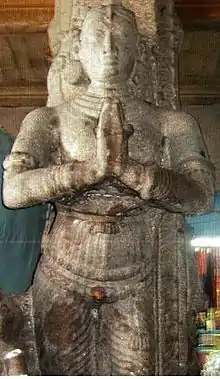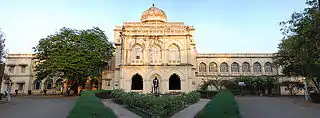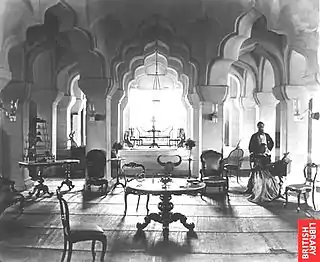Mangammal
Rani Mangammal (died 1705) was a queen regent of the Madurai Nayak kingdom (in present-day Madurai, India) during the minority of her grandson Vijaya Ranga Chokkanatha in 1689—1704.[1] She was a popular administrator and is still widely remembered as a maker of roads and avenues, and a builder of temples, tanks and choultries with many of her public works still in use. She is also known for her diplomatic and political skills and successful military campaigns. The capital of Madurai Kingdom during her times was Tiruchy.
| Rani Mangammal | |
|---|---|
| Queen Regent of Madurai Nayak Kingdom | |
 | |
| Reign | 1689– 1704 C.E. |
| Predecessor | Rangakrishna Muthu Virappa Nayak |
| Successor | Vijaya Ranga Chokkanatha Nayak |
| Born | Madurai |
| Died | Circa 1705 Madurai, present dayTamil Nadu, India |
| Spouse | Chokkanatha Nayak |
| Issue | Rangakrishna Muthu Virappa Nayak |
| House | Madurai Nayaks |
| Father | Tupakula Lingama Nayaka |
| Kings and Queen Regents of Madurai Nayak Dynasty | |
|---|---|
| Part of History of Tamil Nadu | |
 | |
| Madurai Nayak rulers | |
| Viswanatha Nayak | 1529–1563 |
| Kumara Krishnappa Nayak | 1563–1573 |
| Joint Rulers Group I | 1573–1595 |
| Joint Rulers Group II | 1595–1602 |
| Muttu Krishnappa Nayak | 1602–1609 |
| Muttu Virappa Nayak | 1609–1623 |
| Tirumala Nayak | 1623–1659 |
| Muthu Alakadri Nayak | 1659–1662 |
| Chokkanatha Nayak | 1662–1682 |
| Rangakrishna Muthu Virappa Nayak | 1682–1689 |
| Rani Mangammal‡ | 1689–1704 |
| Vijaya Ranga Chokkanatha Nayak | 1704–1731 |
| Queen Meenakshi‡ | 1731–1736 |
| ‡ Regent Queens | |
| Capitals | |
| Madurai | 1529–1616 |
| Tiruchirapalli | 1616–1634 |
| Madurai | 1634–1665 |
| Tiruchirapalli | 1665–1736 |
| Major forts | |
| Madurai 72 Bastion Fort | |
| Tiruchirapalli Rock Fort | |
| Dindigul Fort | |
| Thirunelvelli Fort | |
| other Military forts | |
| Namakkal Fort | |
| Sankagiri Fort | |
| Attur Fort | |
| Palaces | |
| Thirumalai Nayak Mahal, Madurai | |
| Chokkanatha Nayak Palace a.k.a. Durbar Hall, Tiruchirapalli | |
| Rani Mangammal Tamukkam palace Madurai | |
Life and regency
Mangammal was the daughter of Tupakula Lingama Nayaka, a general of Madurai ruler Chokkanatha Nayak (1659–1682). She married Chokkanatha Nayak and became the mother of Rangakrishna Muthu Virappa Nayak (1682—1689).
When her husband died in 1682, he was succeeded by her son. Upon the death of her son in 1689, her son's widow was pregnant. Her son was succeeded by her grandson in 1689. Her daughter-in-law committed sati, and Mangammal became regent during the minority of her grandson.
Many irrigation channels were repaired, new roads were constructed, and avenue trees were planted during the time of Mangammal. The highway from Cape Comorin was originally built during the time of Mangammal and it was known as Mangammal Salai.[2]
She played a key role in assisting the Mughal Army during the Siege of Jinji. Queen Mangammal had realized that the renegade Rajaram had entrenched himself within Jinji and had been bent upon attacking Thanjavur and Madurai if the Mughal Army was to withdraw. Mangammal soon recognized Aurangzeb and the Mughals as her allies and she began to assist Zulfiqar Khan in attacking the fort. When the fort was captured by both Zulfiqar Khan and Mangammal after 8 years, she and her family had control over the fort under the leadership of the Mughals.


References
- N. Subrahmanian: History of Tamilnad, Koodal Publishers, 1972
- The Hindu Rani Mangammal Salai
External links
| Wikimedia Commons has media related to Mangammal. |
- "The Hindu : A town by the Vaigai". The Hindu. Archived from the original on 17 August 2008. Retrieved 14 June 2008.
- Madurai
- Meenakshi Temple
- Madurai.com - Rani Mangammal
- The Hindu: Rani Mangammal Durbar Hall Palace at Trichy
- Tamukkam Palace at Madurai, Now Gandhi Memorial Museum
